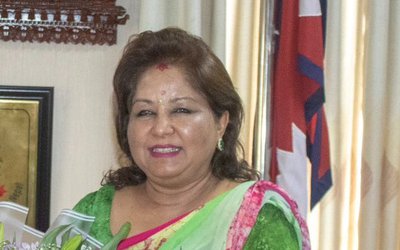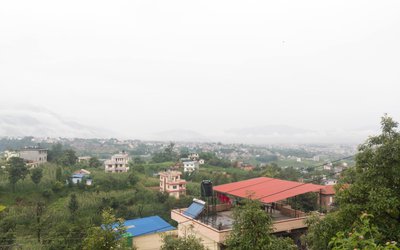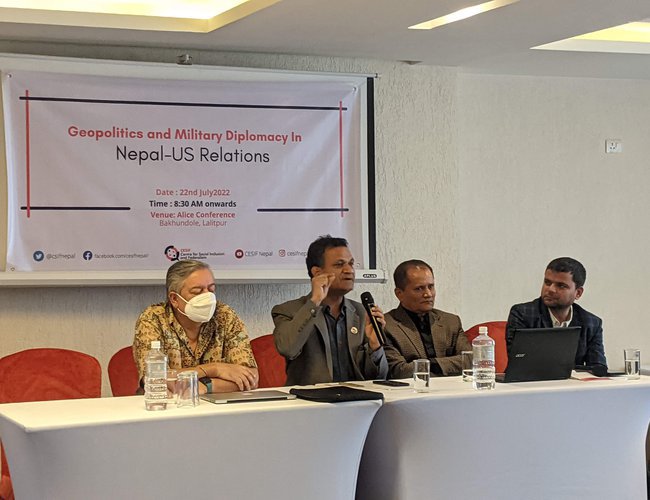
“My situation by no means as agreeable as it might be if these barbarians did but know their own good. Instead of which they are insolent and hostile, and played off on us, as far as they can and dare, the Chinese etiquette and foreign policy.”
The statement by Brian Houghton Hudgson, the first British Resident at the court of Nepal, still rings true if the behavior of Nepalese political players was an indication.
There are many such remarks in the memoir, Life of Brian Houghton Hodgson, by William Wilson Hunter.
When Hudgson was resident in 1834, Nepal’s internal politics was fragile due to factionalism in the internal power centers which were vying for influence by two foreign powers. Rumors based on fake information were used as a tool to make every non-issue a major issue capable of toppling the government of the day and for political revenge.
Over 200 years later, the situation of Nepal resembles the time of Brian Hudgson. From personal communications to social media and large media platforms, rumors and fake pieces of information can circulate in Nepal, with a potential to shake and topple the government and destabilize the country. Until Nepalese leaders and citizens can distinguish what is Nepal’s own good and what is in its interest, nothing will change.
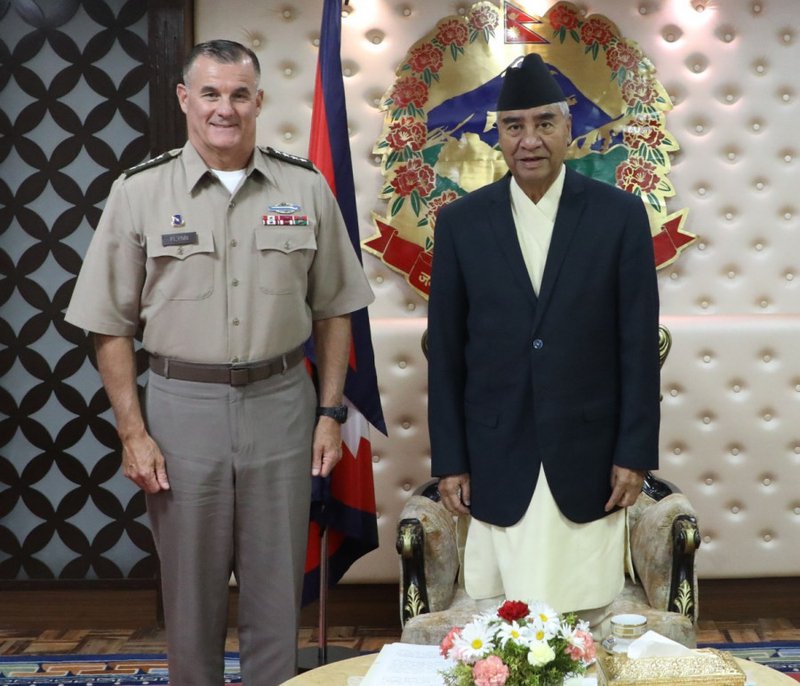
SPP Debate
Having supported Nepal’s overall development throughout the last 75 years after the establishment of diplomatic relations, the United States has played a major role in modernizing institutions and strengthening their capacity, including that of Nepal Army in peacekeeping and disaster and humanitarian management. Eight U.S. Marines have even sacrificed their life in Nepal while conducting a rescue operation during the earthquake in 2015.
Although State Partnership Program (SPP) is a continuing part of U.S humanitarian support to the Nepal Army, fake news and information about made the non-issue into a big issue as if SPP was a military alliance.
“It is unfortunate that a non-issue was blown out of proportion by certain internal and external powers terming it as a major issue,” said a retired military general on condition of anonymity. “This simmering campaign is against Nepal’s own good.”
The general’s observation is close to reality, given the situation. Along with communist-dominated Nepalese parliamentarians, China openly opposed the SPP and India tacitly backed it from behind and SPP turned into a major issue in Nepal’s internal politics.
With its existing strong traditional relations with the Nepalese Army, the Indian establishment sees SPP, which is not hostile or directed to substitute Indian Army’s relations with Nepal, as a tool to minimize the Indian Army’s relations with Nepal Army.
However, a small section of India’s security experts also holds the view that a program like SPP supported by the US ultimately favors India when it has been facing growing influences of China in Nepal.
HudgsonAnd Present Nepal
Although Hudgson’s letter was written in 1833, this also reflects the present situation. If the current ambassador of the world’s only superpower writes his statement, one can easily guess what could be his words.
Although several political systems and rulers have changed in Nepal in its journey from a monarchy to a republican nation, the basic character described by Hudgson has not changed yet. Situated between the two emerging global powers, persons in the statecraft in Nepal and intellectuals in general still run away behind the rumors giving up core interests of the country.
From ministers to the leaders of the coalition, the main opposition and a section of intellectuals and experts, instead of talking about any real issue involved in SPP, they had a one-point agenda to pressure the government to withdraw itself from the SPP and prove Nepal’s non-alignment policy.
Although Sri Lanka, Bangladesh and Maldives are non-aligned countries as well, they are part of SPP. However, Nepalese leaders see joining SPP as tantamount to joining a military alliance.
Nepal has been receiving U.S. support in the humanitarian, military, economic, health, social and development sectors since 1947. “As a superpower, the U.S thinks globally all the time. Now US global development program is named Indo-Pacific, and every U.S. support will be under this name. In a real sense, the term is not a military alliance like CENTO and NATO,” said a retired military general.
SPP Realty Vs Fiction
According to the US embassy in Nepal, the State Partnership Program ‘is not and has never been’ a security or military alliance. The US embassy page on What is SPP clearly notes that.
In the decades since, the program has expanded to cover some 93 nations, including Bangladesh, Sri Lanka and the Maldives, with the aim of “carrying out activities to build partner capacity, improve interoperability enhance the capability to meet emerging challenges.
Nepal’s army issued a statement last month denying that it had ever entered into an SPP agreement, and stressed that it was “always clear about” the fact that it would not be “entering into any military partnership with anyone in the future such that it has an adverse impact on the non-aligned foreign policy adopted by Nepal, its special geopolitical position and strategic sensitivities.”
In October 2015, Nepal applied to join the SPP as it wanted U.S. humanitarian assistance to meet the challenges posed by the April 2015 earthquake. Disaster-prone Nepal requested to join SPP in 2017 and 2019 also.
But a political and foreign affairs analyst, who is also a former Nepalese ambassador to both the US and Britain, emphasized that the SPP was “not all that bad”. Dr. Suresh Chandra Chalise said: “Nepal is vulnerable to natural disasters and some of SPP’s objectives are very relevant to Nepal.”
Critics in Nepal, however, believe that the US could interfere in internal affairs under the guise of the SPP, arguing that participating in the program is tantamount to Nepal signing off on the US’ Indo-Pacific Strategy. Nepali MPs weren’t convinced.
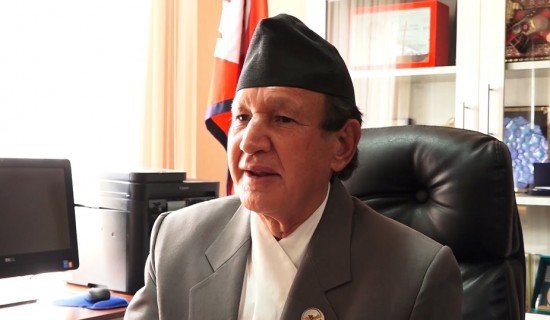
Political Debates
For the last two months, the communist-dominated Nepalese parliament and social media outlets had been full of disinformation regarding Nepal-US State Partnership Program (SPP).
Based on fake information, political leaders and intellectuals were expressing their arguments against SPP. Although Nepali Army has been participating and collaborating with the US in various humanitarian and peacekeeping activities under SPP, communist-led parliament and Maoist-backed coalition have started to debate recently.
Interestingly, all communist parties including CPN-UML, CPN- Unified Socialist, a breakaway of UML, Maoist Center, and Communist Party of Nepal (Masal) are ideologically divided and have bitter relations with each other, what they have in common is a unified stand against the SPP.
Participating in the House session, CPN-UML parliamentarians demanded an answer regarding the government's withdrawal from the State Partnership Program (SPP) and the revelation of correspondences made with the United States.
Among many others, Bhim Rawal, former Defense Minister and a senior leader of the UML and Maoist leader and chief Whip of Maoist Center Dev Gurung, have been harping on the need to go against SPP for a long.
Along with Rawal, former prime minister K.P. Sharma Oli and former foreign minister Pradeep Kumar Gyawali and other MPs of small Communist parties were also against it
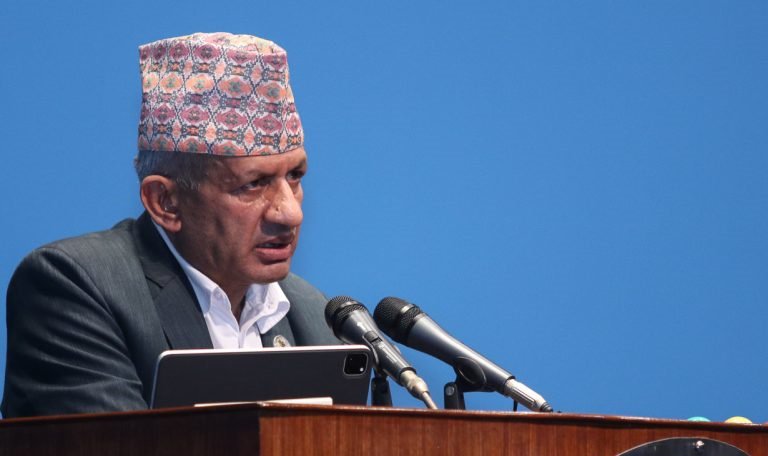
UML leaders are pushing the government to withdraw from the State Partnership Program (SPP) from the Ministry of Foreign Affairs.
Minister Bal Krishna Khand and foreign Minister Dr. NaryanKhadka also spoke randomly in parliament without knowing much about it. Both the ministers said that the government had no intention of signing an SPP agreement during the prime minister’s upcoming visit to Washington.
Seminar On Nepal Geo-politics
At a time when fake news and information have been clouding the reality about SPP and Nepal and US relations, the Center For Social Inclusion and Federalism organized a half-day seminar inviting security experts, former diplomats and politicians on Geo-politics and Military Diplomacy in Nepal-US Relations.
Opening the session, former ambassador to Denmark and chairperson of the center Vijay Kanta Karna highlighted the importance of the seminar in the present context hoping to see factual information on the debate.
His views and understanding of Nepal’s foreign policy and Nepal’s interest were much cleared than that of any politician there. The views expressed by former deputy prime minister and foreign minister Upendra Yadav on SPP were vague and rumor based.
“Nepal should move ahead taking the confidence of China, India and the United States of America. However, Nepal will not join any kind of military alliance with anyone. Nepal will engage with neighboring powers and western power (America) and Nepal will make deals with them. However, Nepal will not make any military alliance or collaboration with any of them,” said Yadav, who is also a key ally of the current five-party coalition government.
Although the United States and Nepal Army officials have been saying that SPP is not a military alliance or military exercise but just a partnership between the two armies for humanitarian and peace-keeping operations, former deputy prime minister Yadav seemed to rely on the rumor based information currently circulated.
“Nepal cannot stand for military collaboration and Nepal cannot join Indo-Pacific Military Alliance. It is in the best interest of Nepal to follow a non-alliance policy,” said Yadav.
Without elaborating how SPP is against Nepal’s core interest, former minister Yadav stated his views saying Nepal is committed not to allowing its soil to be used against any of its neighbors.
Similarly, the UML members of parliament and security expert Dipak Prakas Bhatta blamed a lack of coordination among the government offices in handling foreign and defense policy for the present controversy on SPP. He stressed the need to have coordination among the foreign ministry, defense ministry and Nepal Army.
Retired Army General’s Views
At a time when the debate on SPP has been dominated by politicians and non-military persons, former Chief of Army Staff (CoAS) General Gaurav SJB Rana joined the debate expressing professional thoughts on it.
“SPP is not an agreement or alliance but a program designed to enhance Nepal Army’s humanitarian and disaster rescue capacity.”

He said that Nepal and United States established diplomatic relations under the pretext of cold war. "Our relations if analyzed on historical basis, have been sporadic, incremental and dependable on existing geopolitical conditions," said General Rana. He said that the establishment of diplomatic relations in the field of military assistance has been sporadic incremental. He said that our overall engagement with the U.S has been constituent.
General Rana said that Nepal Army is a major wing of foreign policy since the unification of Nepal saying that there was the backing of the Nepal Army in 1947 to have diplomatic relations with the US.
“Nepal Army is one of the main wings of implementing the foreign policy of the government and there needs a better coordination between the foreign ministry and Nepal Army. Unnecessary efforts are made to drag Nepal Army into controversy in SPP. This is absolutely wrong,” said General Rana.
He said that the army conducts military diplomacy to protect the broader interests of the country. There is no need to be in confusion about the integrity and patriotism of the Nepal Army as the institution of the Nepal Army has not been built overnight. It is an institution that is deeply rooted in Nepal. “For instance, Purano Gorakh Battalion I joined as an office has a history of over 250 years.”
General Rana said that SPP helps to enhance the peacekeeping and humanitarian crisis management capacity of the Nepal Army. He also urged politicians not to put Nepal Army in controversy through SPP.
Retired Major General of Nepal Army Dr. Purna B. Silwal also held the view that the Nepal Army has been pursuing military diplomacy for the protection and promotion of Nepal’s interests.
“As SPP is not an alliance or agreement, Nepal Army has done nothing wrong taking the support to improve its own humanitarian capacity and capability. Nepal Army has been working as per the roles and responsibilities defined by the Constitution of Nepal,” said Major General Silwal. “Nepal Army is an organized and disciplined organization and cannot go against Nepal’s core interest.”
Nepal In Regional Politics
As the global power balance is shifting with India and China vying for their influence in Nepal, both the emerging powers do not see the presence of only a superpower in any form in their interest.
Experts and diplomats hold the view that the current internal debate has nothing to do with Nepal’s own core interest but is broadly a part of the regional geostrategic game plan.
Former ambassador Dr. Dinesh Bhattarai said that Nepal has already entered into a regional geostrategic game plan. The current issue is how Nepal remains a sovereign and independent state. We need to understand that Nepal’s reality is geography and its own handicap and limitation,” said Dr. Bhattarai.
Former Nepalese ambassador to the United States Dr. Suresh Chandra Chalise said that Nepal-US relations started from military collaboration. However, there is the need of an extensive debate on a sensitive issue like joining SPP.
Nepal needs to limit relations with the US just at the bilateral level. On the issue of SPP, there should be an extensive discussion before taking any decision. This is not an issue of this or that party, this leader or that leader but this is an issue which will affect Nepal’s core interests.
“Not only on the domestic front, but Nepal also needs to convince its immediate neighbors and take them in confidence that Nepal’s action and involvement with big power is not going against their interest.
Major General retired Dr. Silwal said that Nepal Army has been taking all initiatives at the interest of the country. “Nepal Army is committed to protecting sovereignty and integrity of the country. Don’t express doubts about the institution.”
Immature Leadership
Sandwiched between the two major powers, Nepal has been facing the same situation as it was back in the 1960s. However, King Mahendra carefully handled the situation balancing all the major powers India, China, the USA and even the USSR for the greater interest of Nepal. He visited the United States, Israel, China, and Russia taking the confidence of Indian leaders at that time. At a time when the global order is shifting and it became more complex, Nepal has a bankrupt leadership with no historical understanding and diplomatic skills that is necessary.
As political leadership is showing immaturity and losing the trust and confidence of Nepal’s two neighbors and other western powers like the US, Nepal will have to face a difficult situation.
Along with the US backed SPP issue, experts in Nepal’s two neighbors are accusing each other of using Nepal’s internal elements against their own interests recently.
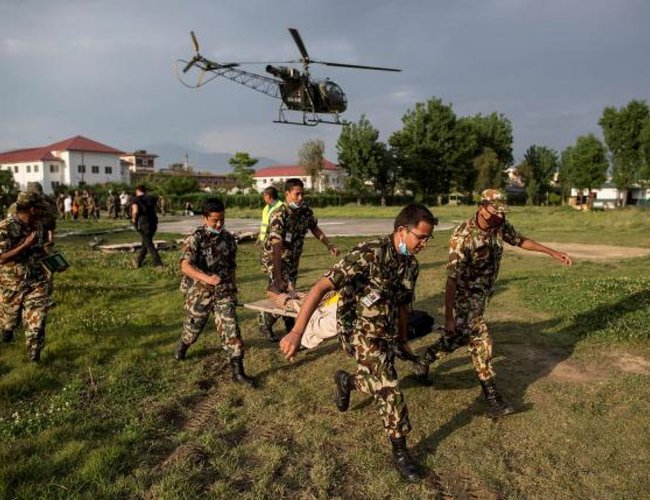
Chinese state media Global Times in its recent article accused Pro-US and Pro-Indian forces of using Nepalese elements to fan anti-China sentiment. Similarly, a senior retired Indian Army commander accused China of encouraging anti-India forces in Nepal.
“Looks like there is going to be a competition of upping the heat by both our northern and southern neighbors. And we poor Nepali have to suffer history’s most incompetent leadership at such a crucial juncture!” tweets Dipak Gyawali in a Global Times Article.
As long as Nepali political leaders are unable to deal properly with Nepal’s southern and northern neighbors about their security concerns and Nepal’s relations with the USA, India and China, which are competing to vie influence in Nepal, will oppose the move of Nepal to take even humanitarian support from western power.
As Hudgson said, Nepalese are yet to see which is good for them or which is not. Raising anti-SPP rhetoric, Nepalese are destroying trustworthy, friendly and good relations with the US. Similarly, Nepalese leaders are losing the trust of Nepal’s two neighbors as well as pushing the country into a most difficult period of uncertainty. Making a non-issue into a big issue, Nepal is losing its own credibility.

Keshab Poudel
Poudel is the editor of New Spotlight Magazine.
- HELVETAS NEPAL’S RIVERBED FARMING: Shift From Overseas To Local Farming
- Jul 26, 2024
- POLITICAL SCENARIO : K.P. Sharma Oli's Resurgence
- Jul 21, 2024
- UNDP/MinErgy: An Inventive Approach To Clean Brick Kiln
- Jul 19, 2024
- HELVETAS NEPAL: Nutrition Through Riverbed Farming
- Jul 18, 2024
- NOU Opens To All: Dr. Shilu Manandhar Bajracharya, Vice Chancellor
- Jul 15, 2024






